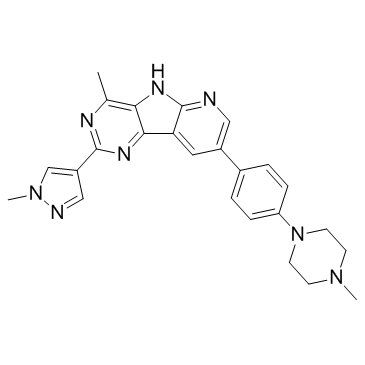1199590-75-4
| Name | GNE 220 |
|---|
| Description | GNE-220 is a potent and selective inhibitor of MAP4K4 with an IC50 of 7 nM. |
|---|---|
| Related Catalog | |
| Target |
MAP4K4:7 nM (IC50) MAP4K5:9 nM (IC50) MAP4K6:1.1 μM (IC50) |
| In Vitro | GNE-220 also inhibits a few other kinases with IC50s of 9 nM, 476 nM and 1.1 μM for MINK (MAP4K6), DMPK and KHS1 (MAP4K5), respectively. GNE-220 alters human umbilical vein endothelial cells (HUVEC) sprout morphology. GNE-220 also reduces pERM+ retraction fibres in a dose-dependent manner. GNE-220 also dose-dependently increased the number of active-INTβ1+ long focal adhesions (FAs)[1]. |
| Kinase Assay | His-tagged MAP4K4 kinase domain (A2-E328) is expressed and purified from SF9 insect cells. 3 μg of purified kinase containing a T181E activating mutation is incubated with 100 μM moesin peptide LGRDKYKTLRQIRQ or purified Myc-Flag-moesin in 50 mM HEPES pH 7.2/10 mM MgCl2/1 mM EGTA/0.01% Triton X-100 for 45 min at room temperature in the presence or absence of 3 μM ATP. Remaining ATP levels are assayed using KinaseGlo[1]. |
| Cell Assay | HUVECs are cultured in complete EGM-2 (CC-3156 and CC-4176). HUVEC are assayed 3 days after siRNA transfection. CHO cells (ATCC, CCL-61) are cultured in DMEM supplemented with 10% FBS, 1 mM Glutamate, and Penicillin/Streptomycin and transfected using Lipofectamine LTX. HUVEC sprouting assays are performed. For siRNA treatment, HUVECs are transfected 1 day before coating to beads. For chemical inhibitor (e.g., GNE-220, 0.1, 1, 10, 100, 1000 and 10000 nM) treatment, is added to media after fibrin is clotted. For immunofluorescence staining, beads are seeded in thin 100 μL fibrin clots. For scratch wound healing assay, HUVEC are transfected 2 days before re-seeding into a glass-bottom 96-wells plate[1]. |
| References |
| Molecular Formula | C25H26N8 |
|---|---|
| Molecular Weight | 438.53 |
| Storage condition | 2-8℃ |
